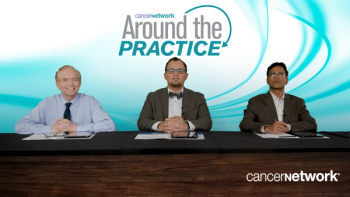
The discussion shares key takeaways and practical insights for optimizing the referral and treatment process for CAR T-cell and bispecific therapies.

Your AI-Trained Oncology Knowledge Connection!


The discussion shares key takeaways and practical insights for optimizing the referral and treatment process for CAR T-cell and bispecific therapies.

The discussion focuses on protocols for monitoring long-term complications from CAR T-cell and bispecific therapies, improving patient reintegration into community care posttreatment, and enhancing communication between academic and community oncologists.

The discussion examines whether the CAR T-cell referral process differs for in-state vs out-of-state patients, the role of social factors, and any changes or challenges in the referral process following recent CAR T approvals.

Medical experts discuss the CAR T-cell therapy referral process between community and academic centers, how academic centers can aid community oncologists in identifying eligible patients, determining suitable referrals, and managing patient expectations.

Medical experts discuss how adverse events vary by bispecific class, the specific adverse events observed in practice, and their management strategies.

Medical experts explore common types of referrals, compare in-state vs out-of-state processes, and examine the impact of social factors on the referral process.

Medical experts examine differences and similarities in the referral process and treatment protocols for non–BCMA-targeted vs BCMA-targeted bispecific therapies, including aspects like step-up dosing and premedication.

Medical experts address the referral process for bispecific therapy between community and academic centers, including patient eligibility and educational requirements such as REMS certification.

Community and academic oncologists discussed how effective communication between practices can enhance multiple myeloma outcomes.

Medical experts discuss streamlining referrals to reduce treatment delays, optimizing resources, comparing outcomes in collaborative vs noncollaborative settings, and managing patient reluctance about academic center referrals.v

Medical experts highlight the critical role of collaboration between academic and community physicians in managing multiple myeloma, focusing on coordinating care, maintaining communication, and ensuring centers are prepared for patient transitions.
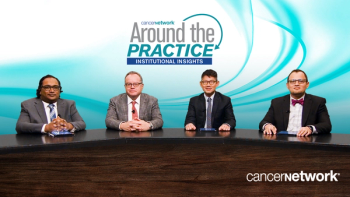
The panel concludes its discussion with key takeaways on the evolving treatment landscape for multiple myeloma.

Experts on multiple myeloma look to the future treatment landscape and discuss exciting updates presented at the 2024 ASCO Annual Meeting, highlighting belantamab mafodotin and combination therapies.

Samer Al'Hadidi, MD, provides a comprehensive overview of adverse event management practices for patients with multiple myeloma who receive CAR T-cell therapy.

Hans Lee, MD, discusses recent updates presented at ASCO 2024 surrounding cilta-cel CAR T-cell therapy in relapsed/refractory multiple myeloma.

Myeloma specialists discuss considerations they consider when determining how they sequence CAR T-cell therapies and bispecific antibodies.

Following ASCO 2024, Samer Al'Hadidi, MD, discusses recent updates from the PERSEUS trial evaluating the role of testing for minimal residual disease (MRD) in guiding treatment for relapsed/refractory multiple myeloma.

Experts on multiple myeloma provide comprehensive insights on treatment spacing and step-up dosing practices and discuss the long-term utilization of bispecific antibodies.

The expert panel shares clinical insights on sequencing CAR T-cell therapies and bispecific antibodies for patients with relapsed/refractory multiple myeloma.

Naresh Bumma, MD, and Hans Lee, MD, recap recent updates on the MagnetisMM-30 an MagnetisMM-32 studies investigating elranatamab, a BCMA-directed bispecific antibody.

Samer Al'Hadidi, MD, provides an overview of recent updates presented at ASCO 2024 from the MajesTEC-1 trial evaluating teclistamab in patients with relapsed/refractory multiple myeloma.

Hans Lee, MD, discusses recent updates from the MonumenTAL-2 study investigating talquetamab in patients with relapsed/refractory multiple myeloma.

Focusing on recent approvals in earlier lines of relapsed/refractory multiple myeloma, the panel has a comprehensive discussion on the CARTITUDE-4 and KarMMa-3 studies and shares clinical insights on administering CAR T-cell therapy and monitoring patients.

A panel of experts on multiple myeloma introduce themselves and discuss recent data presented on the phase 3 IMROZ trial for transplant-ineligible patients with newly diagnosed multiple myeloma (NDMM).
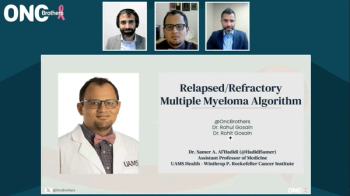
Samer Al'Hadidi, MD, offers advice to community oncologists who treat patients with relapsed/refractory multiple myeloma, and the Oncology Brothers recap the entire discussion.

Rohit Gosain, MD, and Rahul Gosain, MD, are joined by Samer Al'Hadidi, MD, to discuss treatment decision-making strategies for patients with relapsed/refractory multiple myeloma.

In a discussion with the Oncology Brothers on the treatment of patients with relapsed/refractory multiple myeloma, Samer Al'Hadidi, MD, discusses adverse effects associated with CAR T-cell therapy and bispecific antibodies.

An expert on the treatment of multiple myeloma discusses the role of CAR T-cell therapy in relapsed/refractory disease.

Samer Al'Hadidi, MD, discusses monitoring strategies for patients with relapsed/refractory multiple myeloma who are receiving lenalidomide.
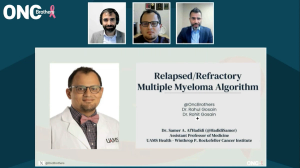
Published: May 13th 2024 | Updated:
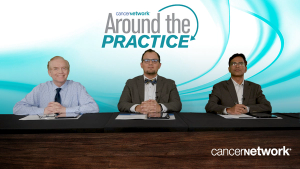
Published: September 6th 2024 | Updated:

Published: May 13th 2024 | Updated:

Published: May 13th 2024 | Updated:

Published: May 13th 2024 | Updated:

Published: October 4th 2024 | Updated: